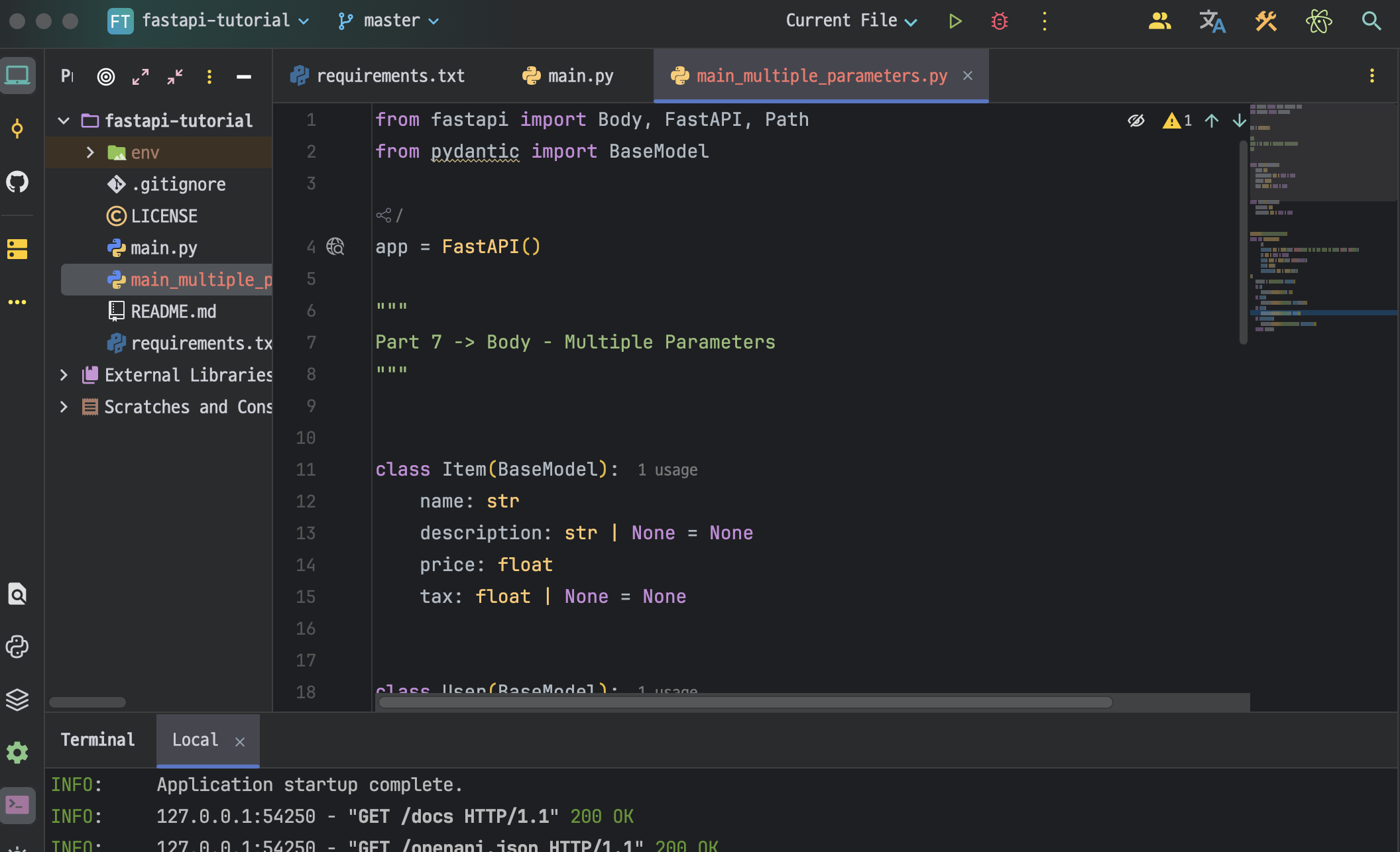Pycharm and FastAPI
Pycharm and FastAPI
fastapi를 pycharm을 통해 학습해봅시다 실습환경 : Mac(M3), IDE : Pycharm
Python 다운로드 및 프로젝트 생성
먼저 python을 brew를 통해 다운받는다. 만약 brew가 없다면
1
/bin/bash -c "$(curl -fsSL https://raw.githubusercontent.com/Homebrew/install/HEAD/install.sh)"
brew로 다운로드
1
2
3
brew update
brew install python
python3 --version
pycharm 프로젝트 생성 후 requirements.txt를 생성 및 작성
1
2
fastapi
uvicorn[standard]
이제 가상환경을 생성하고 활성화한다.
1
2
python -m venv env
source env/bin/activate
참고로 비활성화 하고싶을 땐 deactivate
이제 이 요구사항을 다운받는다
1
pip install -r requirements.txt
main.py를 생성 후 작성한다
1
2
3
4
5
6
7
8
9
10
11
12
13
14
15
16
17
from math import trunc
from fastapi import FastAPI
app = FastAPI()
@app.get("/", description="This is our first route.", deprecated=True)
async def base_get_route():
return {"message": "Hello World"}
@app.post("/")
async def post():
return {"message": "Hello From the Post Route"}
@app.put("/")
async def put():
return {"message": "Hello From the Put Route"}
이후 ` uvicorn main:app –reload ` 으로 실행해보면 제대로 동작한다. Swagger 명세서를 보고싶다면 뒤에 /docs, 다른 버전으로 보려면 /redoc 붙이면 된다.
Path Parameters
1
2
3
4
5
6
7
8
9
10
11
12
13
14
15
16
17
18
19
20
21
22
23
24
25
26
27
28
29
30
31
32
33
34
35
36
37
38
from enum import Enum
from math import trunc
from pyexpat.errors import messages
from fastapi import FastAPI
app = FastAPI()
@app.get("/users")
async def list_users():
return {"message": "list users route"}
@app.get("/users/{user_id}")
async def get_user(user_id: str):
return {"user_id": user_id}
@app.get("/users/me")
async def get_current_user():
return {"Message": "this is the current user"}
class FoodEnum(str, Enum):
fruits = "fruits"
vegetables = "vegetables"
dairy = "dairy"
@app.get("/foods/{food_name}")
async def get_food(food_name: FoodEnum):
if food_name == FoodEnum.vegetables:
return {"food_name": food_name,
"message": "you are healthy"}
if food_name.value == "fruits":
return {"food_name": food_name,
"message": "you are still healthy, but like sweet things"}
return {"food_name": food_name,
"message": "you are not healthy"}
Request Body
1
2
3
4
5
6
7
8
9
10
11
12
13
14
15
16
17
18
19
20
21
22
23
24
25
26
27
28
29
30
31
32
from enum import Enum
from fastapi import FastAPI
from pydantic import BaseModel
from typing import Optional
app = FastAPI()
@app.get("/items2")
async def read_items(
q: str
| None = Query(
...,
min_length=3,
max_length=10,
regex="^[a-zA-Z]*$",
title="Sample Query String",
description="This is a sample query string",
deprecated=True,
alias="item-query"
)
):
results = {"items": [{"item_id": "Foo"}, {"item_id": "Bar"}, {"item_id": "Baz"}]}
if q:
results.update({"q": q})
return results
@app.get("/items2/hidden")
async def hidden_query_route(hidden_query: str | None = Query(None, include_in_schema=False)):
if hidden_query:
return {"hidden_query": hidden_query}
return {"hidden_query": "Not Found"}
Query Parameter and Numeric Validation
1
2
3
4
5
6
7
8
9
10
11
12
13
14
15
16
17
18
19
20
21
22
23
24
25
26
27
28
29
30
31
from math import trunc
from pyexpat.errors import messages
from fastapi import FastAPI
from fastapi import FastAPI, Query
from pydantic import BaseModel
from typing import Optional
@app.get("/items2")
async def read_items(
q: str
| None = Query(
...,
min_length=3,
max_length=10,
regex="^[a-zA-Z]*$",
title="Sample Query String",
description="This is a sample query string",
deprecated=True,
alias="item-query"
)
):
results = {"items": [{"item_id": "Foo"}, {"item_id": "Bar"}, {"item_id": "Baz"}]}
if q:
results.update({"q": q})
return results
@app.get("/items2/hidden")
async def hidden_query_route(hidden_query: str | None = Query(None, include_in_schema=False)):
if hidden_query:
return {"hidden_query": hidden_query}
return {"hidden_query": "Not Found"}
This post is licensed under
CC BY 4.0
by the author.

